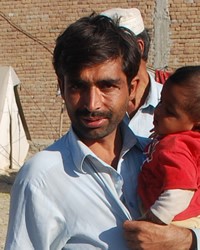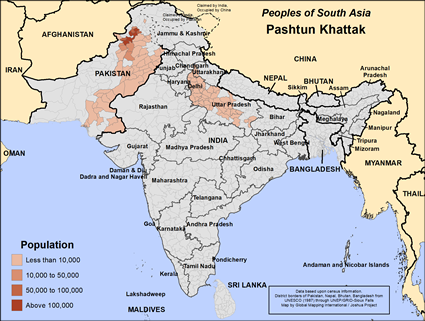Pashtun Khattak in Pakistan

Photo Source:
Hashoo Foundation - Flickr
Creative Commons
|

Map Source:
People Group data: Omid. Map geography: UNESCO / GMI. Map Design: Joshua Project
|
| People Name: | Pashtun Khattak |
| Country: | Pakistan |
| 10/40 Window: | Yes |
| Population: | 1,438,000 |
| World Population: | 1,468,000 |
| Primary Language: | Pashto, Northern |
| Primary Religion: | Islam |
| Christian Adherents: | 0.00 % |
| Evangelicals: | 0.00 % |
| Scripture: | Complete Bible |
| Ministry Resources: | Yes |
| Jesus Film: | Yes |
| Audio Recordings: | Yes |
| People Cluster: | South Asia Muslim - Pashtun |
| Affinity Bloc: | South Asian Peoples |
| Progress Level: |
|
Introduction / History
The Pashtun are probably the largest tribal people in the world. The Khattak are a sub-group of the Pashtun. Most Khattak live in northwestern Pakistan near the Afghan border. A smaller group has migrated to India. Pashtun are called Pathan in India. Pashtun are the second largest ethnic group in Pakistan. Arab-funded madrassas (religious schools) throughout Pakistan, became the seedbed for the rise of the Taliban movement. Driven by a combination of religious zeal and Pashtun nationalism, and fueled by Arab money, the "Taliban" (a term for "religious students") imposed a harsh, hyper-conservative (Wahhabi) version of Islam on Afghanistan. Instability, endemic corruption, and ongoing violence have led to widespread disillusionment—and the migration of tens of thousands of Pashtuns seeking jobs and opportunities outside of their homeland. The Khattak speak Northern Pashto, one of the two major Pashtun languages. Pashtun in India speak Urdu as their first language.
What Are Their Lives Like?
Pashtun's primary loyalty is to his particular social group (tribe or sub-tribe). The Khattak claim that they are descendants of 17th century legendary Pashtun warrior-poet Khushai Khan Khattak. All Pashtun share a common descent; the Islamic religion; the Pashtunwali Code of Honor; and to some extent, language (Pashto). The greatest evil for the Pashtun is to disgrace one's family, clan, or tribe. The Pashtun, especially the rural ones, live and die based on their code of honor. Many Khattak have moved to urban areas and taken up jobs in construction, factories, the oil industry, and retail. The traditional occupations of the Pashtun Khattak in Pakistan are agriculture and animal husbandry. One could almost say that a third profession of the Pashtun is warfare. They have been fighting outsiders and among themselves for centuries. Every Pashtun man considers himself a warrior. The life of a Pashtun Khattak woman depends upon where she lives. In the countryside, women follow the traditional role of being wives and caretakers for their children. In cities, women are more likely to obtain an education and work outside of the home. A man may have up to four wives in Islam if he can afford them. Most men marry only one wife. Young people marry within their clan. Children, especially boys, are seen as a blessing from Allah.
What Are Their Beliefs?
The Pashtun Khattak are Sunni Muslims, the largest branch of Islam. Being a Muslim is viewed an essential part of the Khattak's identity. Khattak try to obey the teachings of the Koran and the prophet Mohammad. Sunnis believe that by following the Five Pillars of Islam that they will attain heaven when they die. Allah, the supreme God of the universe, determines who enters paradise. Sunnis pray five times a day facing Mecca. They fast the month of Ramadan. They attend mosque services on Friday. If a Muslim has the means, he or she will make a pilgrimage to Mecca once in his or her lifetime. Muslims are also prohibited from drinking alcohol, eating pork, gambling, stealing, using deceit, slandering, and making idols. If a Khattak man or woman becomes a follower of Isa, Jesus Christ, he or she will face persecution from his or her family and the community. There are few if any followers of Jesus Christ among the Khattak.
What Are Their Needs?
The Khattak need to hear and understand the life-saving message of Jesus Christ. He alone can forgive their sins and grant them eternal life. Rural Pashtun have an oral culture. Most rural women and many men are unable to read and write. Kakar would benefit from better access to modern medicine and education.
Prayer Points
Pray for the wide distribution of Northern Pashto radio programs. Pray that the Spirit will lead many Khattak to tune into and listen to these broadcasts. Pray for an openness to the gospel among Khattak leaders and elders. Ask the Lord to raise up a church planting movement among the Pashtun Khattak of Pakistan in this decade.